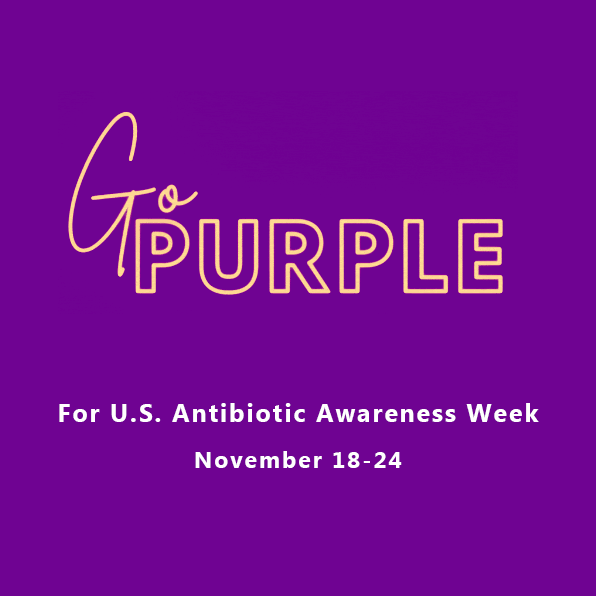Minnesota One Health Antibiotic Stewardship Collaborative (MOHASC)
- MOHASC Home
- About MOHASC
- News and Events
- Conferences and Presentations
- Honor Roll
- Stories
- Resources and Print Materials
- Contact Us
Related Topics
U.S. Antibiotic Awareness Week
U.S. Antibiotic Awareness Week (USAAW) is observed annually during November 18–24 to bring attention to the critical role antibiotics play in human health, environmental health, animal health, and beyond.
State of Minnesota Proclamation: Antibiotic Awareness Week (PDF)
Governor Walz proclaims Nov. 18-24 as Antibiotic Awareness Week in Minnesota.
Subscribe to One Health Antibiotic Stewardship Collaborative Updates
Get email updates with antibiotic stewardship news, resources, & stories.
It Takes All of Us
 | CDC's 2025 theme for USAAW is "Fighting Antimicrobial Resistance Takes All of Us." Each day during USAAW, MDH & CDC focused on a different theme. A variety of resources are available to help you participate at CDC: U.S. Antibiotic Awareness Week (USAAW) Toolkit. |
 | Minnesota landmarks (Lowry Avenue Bridge, I-35W Bridge, Minneapolis Convention Center, Eagan's Sperry Tower, Faribault water tower, and Mayo Clinic's Plummer Building) will light up purple on Tuesday, Nov. 18 for the "Go Purple" USAAW campaign. Wear purple and look out for email campaigns and opportunities to engage on social media. |
 | Stories of Antibiotic Use and Resistance Minnesota families, residents, health professionals, educators, and farmers share their experiences and challenges with antibiotic use and resistance. |
Webinars
These educational webinars are focused on antibiotic stewardship and the management of common infections in long-term care (LTC) facilities. They are part of MDH’s ongoing efforts to support LTC clinicians, pre-professional students, infection preventionists, and stewardship champions in improving diagnosis, treatment, and antibiotic use.
Upper Respiratory Tract Infections in Long-term Care Patients (PDF)
- Presenter: Jesse Dennison, PharmD
- Description: Learn practical strategies to improve diagnosis, reduce unnecessary antibiotic use, and enhance resident outcomes for respiratory infections.
POSTPONED:
Antibiotic Stewardship and the Management of Urinary Tract Infections in LTC
- Presenter: Galina Shteyman, PharmD, BCPS, BCIDP
- Description: Explore evidence-based approaches for accurate UTI diagnosis, distinguishing asymptomatic bacteriuria, and optimizing UTI management.
Arizona Department of Health Services
AHDS Making an IMPACT Together Webinar Series Flyer (PDF)
- Date/Time: Nov. 18-21, 2025 | 10 a.m. – 1 p.m. CT
- Description:
- Tuesday, Nov. 18: ADHS Office of HAI Year in Summary
- Wednesday, Nov. 19: Challenges in Stewardship and Resistance
- Thursday, Nov. 20: Dental Antibiotic Stewardship
- Friday, Nov. 21: One Health
Key resources
- One Health Antibiotic Stewardship Resources and Print Materials
- Frequently Asked Questions (FAQs) About Antimicrobial Use and Resistance
- Antibiotics Only When Needed (O.W.N.)
- Prescribing Antibiotics in Outpatient Settings during the COVID-19 Pandemic (PDF)
- UMN College of Veterinary Medicine (CVM): Antimicrobial Resistance and Stewardship Initiative
- UMN CVM: Antimicrobial Resistance Learning Site
- MDA: Livestock Recordkeeping Booklet Request Form
- MPCA: Don't flush medicines down the drain
- CDC: Antibiotic Prescribing and Use
- CDC: COVID-19 & Antimicrobial Resistance
- CDC: Core Elements of Antibiotic Stewardship
- CDC: Be Antibiotics Aware Partner Toolkit
2024 USAAW
- State of Minnesota Proclamation: Antibiotic Awareness Week (PDF)
Governor Walz proclaims Nov. 18-24 as Antibiotic Awareness Week in Minnesota. - One Health Antibiotic Stewardship Collaborative Updates
- Nov. 18: U.S. Antibiotic Awareness Week: One Health Spotlight
- Nov. 19: U.S. Antibiotic Awareness Week: Global Health Spotlight
- Nov. 20: U.S. Antibiotic Awareness Week: Human Health Spotlight
- Nov. 21: U.S. Antibiotic Awareness Week: Animal Health Spotlight
- Nov. 22: U.S. Antibiotic Awareness Week: Environmental Health Spotlight
- Minnesota Board of Dentistry: U.S. Antibiotic Awareness Week Dental Health Spotlight
MDH
Epidemiologists briefly reviewed results from a recent survey of Minnesota dentists on antibiotic stewardship and prescribing practices. Building on this data, Erinne Kennedy, DMD, MPH, MMSc, a national spokesperson for dental antibiotic stewardship, shared practical resources and guidelines for optimizing antibiotic use in dental settings.
- Friday, Nov. 15, 2024 | 12-1 p.m. CT
Data-Driven Dental Antibiotic Stewardship: State Survey Findings and Stewardship Resources (PDF)
CDC
- Tuesday, Nov. 19, 2024 | 6:30-8 a.m. CT
International Infection Control Branch
The Race Against Antimicrobial Resistance in Neonates: Insights on Data, Prevention, and Stewardship (YouTube) - Wednesday, Nov. 20, 2024 | 2-3 p.m. CT
CDC and Federal Office of Rural Health Policy
Implementation of Priority Core Elements in Critical Access Hospitals (YouTube)
American Society of Health-System Pharmacists
- Tuesday, Nov. 19, 2024 | 12-1 p.m. CT
Penicillin Allergy De-labeling as a Tool for Inpatient Antimicrobial Stewardship: A Real-World Experience
(open to ASHP members only) - Thursday, Nov. 21, 2024
Clinical Conversations Podcast
Be Antibiotics Aware: Management of Community-acquired Pneumonia in Hospitalized Adults
2023 USAAW
- State agencies, partners team up to combat antibiotic resistance with One Health approach
MDH news release, November 16, 2023. - State of Minnesota Proclamation: Antibiotic Awareness Week (PDF)
Governor Walz proclaims Nov. 18-24 as Antibiotic Awareness Week in Minnesota. - One Health Antibiotic Stewardship Collaborative Updates
- Nov. 13: Get Ready for Antibiotic Awareness Week!
- Nov. 17: U.S. Antibiotic Awareness Week 2023 is here!
- Nov. 20: U.S. Antibiotic Awareness Week: Human Health Spotlight
- Nov. 21: U.S. Antibiotic Awareness Week: Animal Health Spotlight
- Nov. 22: U.S. Antibiotic Awareness Week: Environmental Health Spotlight
Urgent Care Association (UCA) College of Urgent Care Medicine
Nov. 14, 2023
Common Myths & New Successes in Urgent Care Antibiotic Stewardship
American Society of Health-System Pharmacists (open to ASHP members only)
Nov. 15, 2023
Antibiotic Stewardship 2023: CDC Updates and Case Examples using National Healthcare Safety Network Antimicrobial Use Option
International Pharmaceutical Federation
Nov. 21, 2023
New roles of pharmacists in antimicrobial resistance: Fungal disease management
2022 USAAW
- State of Minnesota Proclamation: Antibiotic Awareness Week (PDF)
Governor Walz proclaims Nov. 18-24 as Antibiotic Awareness Week in Minnesota. - One Health Antibiotic Stewardship Collaborative Updates
Swish and Swallow - Antibiotic Stewardship in Dentistry
Recorded on Wednesday, November 23, 2022
Katie J. Suda, PharmD, M.S., FCCP
Professor of Medicine and Pharmacy & Therapeutics
Associate Director, Center for Pharmaceutical Policy and Prescribing
University of Pittsburgh Schools of Medicine and Pharmacy
Dr. Suda is a Clinical Pharmacy Specialist, Core Investigator and Associate Director of Clinical Therapeutics with the VA Center for Health Equity Research and Promotion and Professor of Medicine and Pharmacy at the University of Pittsburgh Schools of Medicine and Pharmacy, Associate Director of the Center for Pharmaceutical Policy and Prescribing, and Director of the Transition to Independence Program. Dr. Suda is a national expert in outpatient prescribing patterns and antibiotic stewardship. Dr. Suda received a Doctor of Pharmacy degree from Drake University and a Master’s in epidemiology at the University of Tennessee. Dr. Suda’s post-doctoral training includes a residency at Baptist Memorial Health Care, a pharmacokinetics fellowship at the Clinical Pharmacokinetics Laboratory and an infectious diseases and outcomes research fellowship at the University of Illinois at Chicago.
- Describe antibiotic prescribing by dentists in the United States.
- Define appropriate indications for antibiotics for common dental indications.
- Discuss application of antibiotic stewardship in dentistry.
Contaminants of Emerging Concern in Minnesota’s Surface Water
Pharmaceuticals, Personal Care Products, and Endocrine Active Chemicals
Recorded on Wednesday, November 16, 2022
Mark Ferrey, BS, MS
Environmental Scientist, Minnesota Pollution Control Agency
Mark Ferrey is an environmental scientist at the Minnesota Pollution Control Agency where he has worked for 20 years. Before coming to the MPCA, he studied the microbial degradation of pesticides in soil at the University of Minnesota. Since then, he has focused on monitoring and understanding the fate of contaminants in the environment. He is currently studying pharmaceuticals and endocrine active compounds in Minnesota’s surface water. Mark has BS and MS degrees in microbiology and environmental science, both from the University of Minnesota.
- Learn what pharmaceuticals, including antibiotics, are found in surface water and at what concentrations.
- Identify pharmaceuticals and other contaminants that have been detected in fish.
- Describe the effects these chemicals may be having on fish and wildlife.
Two Successful Veterinary Antibiotic Stewardship Initiatives
Food Animal Antibiotic Residue Prevention and Antibiotic Use Measurement in Dogs and Cats
Recorded on Monday, November 14, 2022
Jennifer Granick, DVM, PhD, DACVIM
Associate Professor of Small Animal Internal Medicine, University of Minnesota College of Veterinary Medicine
Topic: Tracking Antibiotic Use in Dogs and Cats: Methods for Data Collection, Summary of National Data, and Opportunities for Action
Jennifer Granick, DVM, PhD, Diplomate ACVIM is an associate professor of small animal internal medicine at the University of Minnesota College of Veterinary Medicine. Her research focuses on clinical antibiotic use and antimicrobial stewardship. She is Co-director of the Antimicrobial Resistance and Stewardship Initiative (ARSI) at the University of Minnesota and the Companion Animal Veterinary Surveillance Network. She chairs the University of Minnesota Veterinary Medical Center’s Antimicrobial Stewardship Committee.
Sandra Larson, DVM
Drug Residue Consultant and Outreach Veterinarian, Laboratory Evaluation Officer
Minnesota Department of Agriculture
Topic: Preventing Drug Residues in Minnesota Milk and Meat: Minnesota’s Drug Residue Prevention Program
Dr. Sandra Larson graduated from University of Minnesota Veterinary School. Before joining the Minnesota Department of Agriculture, she was in private practice for 23 years. Sandy's role with the Minnesota Department of Agriculture is as a Drug Residue Consultant and Outreach Veterinarian, and a Laboratory Evaluation Officer for milk screenings. She has conducted on-farm site visits for both tissue and milk residue violations.
- Understand the concept of pharmaceutical residues in food-animal products.
- Recognize the importance of the drug approval and labeling process, regulation of use, and on-farm practices to prevent meat and milk residues.
- Identify current methods available to track antibiotic use in companion animals, including dogs and cats.
- Summarize companion animal prescribing data available from two national FDA-funded surveys.
- Recognize data-driven opportunities to improve prescribing in companion animal practice.
Contact
If you have questions, please contact health.stewardship@state.mn.us.